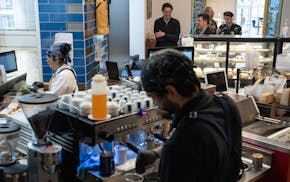Climbing sales for a made-in-Minnesota system treating atrial fibrillation helped sustain Boston Scientific's streak of bullish results as the company brushed off tariffs.
The medtech company's pulsed field ablation system, Farapulse, treated more than 200,000 patients with A-fib over the course of a year, pulling in more than $1 billion to treat the common quivering-heart disease that raises the risk of stroke. The console for the system, which delivers electric pulses to the heart through a catheter, is made in Minnesota.
Pulsed field ablation technology, CEO Mike Mahoney said in a recent interview, may be the biggest "disruptive product in a decade in all of medtech."
Boston Scientific, with approximately 10,000 employees in Minnesota, reported a fourth-quarter adjusted net profit of $1 billion on $4.6 billion in sales, according to a quarterly investors presentation Wednesday. Sales grew by 19.5% on an organic basis.
For the full year, it reported adjusted profits of $3.7 billion on $16.7 billion in sales of medical devices. Revenue grew for the year by 16.4% on an organic basis. The company's stock was up about 1.5% as of 11:09 a.m. Wednesday.
All eight of Boston Scientific's business divisions have a presence in Minnesota, and the state is home to roughly 20% of its global operations footprint.
Mahoney told investors on the quarterly call the company has "more tailwinds than headwinds."
Some of those headwinds may include potential tariffs affecting trade with Canada, China and Mexico, as well as more competition for Farapulse.
Chief Financial Officer Daniel Brennan said Wednesday that the company does not have significant levels of manufacturing in or sourcing from Canada, China or Mexico.
"While the recent executive actions relative to these countries could present a minor headwind for the year," Brennan said, "we view these headwinds as manageable, and they've been contemplated in our guidance ranges."
Mahoney told investors the company is facing some strengthening lower-cost competitors in Asia and Europe, which is creating a headwind for the company's endoscopy and urology businesses.
"We're challenging our team to continue to drive a lower-cost portfolio so we can serve our global customers more efficiently," Mahoney said.
Another potential headwind: Pulsed field ablation competition may increase with time as other leading medtech companies like Medtronic have the systems. "A lot of that is out of our hands," Mahoney said.
The CEO said in the interview the company's investors would spend 45 minutes out of every hour speaking about Farapulse and Watchman, Boston Scientific's small parachute-shaped device preventing blood clots from forming in the left atrial appendage.
Sales for Farapulse's business segment, the electrophysiology unit, grew 172% in the fourth quarter and 139% for all of 2024.
"Farapulse has continued to lead a transformation of the A-fib market," Mahoney said.
Currently, the Farapulse system is approved for treatment of patients with occasional A-fib episodes. Initial results of a study recently showed Farapulse achieved primary safety and effectiveness endpoints for patients with persistent A-fib, which would create additional market opportunity for the system.
Adjusted earnings per share (EPS) amounted to 70 cents, surpassing Wall Street expectations by 4 cents per share.
Last week, Abbott Laboratories, a health care and medtech company employing about 5,000 workers in the Twin Cities, reported an adjusted profit of $2.3 billion on fourth-quarter sales of $11 billion. Sales for its medical device division increased to $5.1 billion, rising by 14% on an organic basis.
Abbott's structural heart division, which has a significant presence in Minnesota, led growth for the medical devices business.
Abbott projected organic sales growth for fiscal year 2025 to fall between 7.5% and 8.5%. It guided for adjusted EPS to fall between $5.05 to $5.25 for the year.
Medtronic will release its latest quarterly results on Feb. 18.
J.P. Morgan analyst Robbie Marcus called Boston Scientific a "top pick" in a note to investors.
"A strong close to the year sets the stage for what we think is another year of outperformance in 2025, with multiple shots on goal across the business to maintain a healthy top line with more margin expansion and free cash flow in 2025+," Marcus said.
Mahoney said in an interview that five years after pandemic stuck the U.S., patient demand is now steady after falling then spiking.
For fiscal year 2025, Boston Scientific expects sales growth of 10% to 12% on an organic basis, and profit to land between $2.80 to $2.87 per share on an organic basis.
"For the last couple of years, we've been the highest-performing company in all of medtech for large companies," Mahoney said. "We think we'll do that again this year, and our aim is to do that ... through 2030."

Why now might be the best time to make a deal on boats, ATVs and other powersports

To reset downtown Minneapolis skyway life, building owners cut deals with retailers

Ramstad: AI is English-centric, but it's picking up Hmong quickly
Don't throw away perks that come with insurance and memberships
